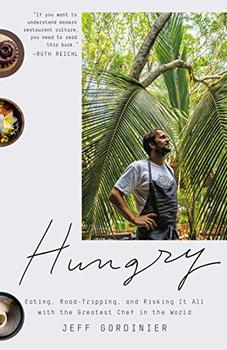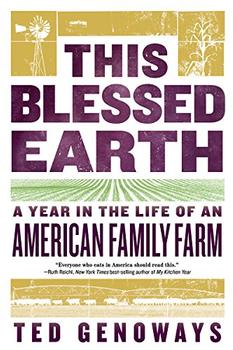Summary | Excerpt | Reading Guide | Reviews | Beyond the book | Read-Alikes | Genres & Themes | Author Bio

A Year of Food Life
by Barbara KingsolverThe book market is becoming
filled with tomes advising us how to save our planet (or more accurately, keep it habitable for humanity). Some
of these 'green reads' are earnest,
some are epicurean, all beat the environmental
drum, and most will only be read by those already
leaning towards that way of thinking. Animal,
Vegetable, Miracle stands out from the crowd
because it is a book that has the ability to appeal
to the crowd. It
is to food as Bill Bryson's books are to travel -
accessible and appealing to a far wider audience
than most of its genre. With input from her
biologist husband, Steven (who provides footnotes
relating to the food industry) and 19-year-old
daughter, Camille (who provides tasty recipes and
the voice of a younger generation) Barbara
Kingsolver chronicles a year in which her family
lived as close to the land as they could - buying
locally grown foods or growing it themselves, while
also maintaining their day jobs.
The result is an honest to goodness, often
laugh-out-loud funny read which evangelizes without
proselytizing, educates and inspires without
berating. The reports of 9-year-old Lily's egg
business, and the reproductive habits of turkeys
who've forgotten how to reproduce naturally after
generations of artificial insemination and
incubators, are particularly entertaining.
Having said that, not all reviewers are
inspired. Negative reviews come from those who feel
that Kingsolver is promoting a la-la land idyll that
isn't sustainable by real people on real budgets.
These reviewers point to the fact that
organic foods bought in the supermarket are almost
always substantially more expensive than
conventionally grown foods, and they get positively
apoplectic about Kingsolver and her husband swanning off to
Italy in a carbon-emitting jet propelled airplane
for a two-week second honeymoon in the middle of
their "locavore" year.
Admittedly, the international vacation is something
of a red rag to a bull but Kingsolver is not setting
herself up as a saint and the couple's observations of Italian life, where
local foods are prized above all, does offer a
valuable contrast to the USA, where few supermarket
shoppers are interested to know where their food has
come from.
However, the reviewers who write-off
Animal, Vegetable, Miracle because organic foods
in the supermarket are too expensive seem to have
substantially missed the point of Kingsolver's book,
to the point that it's questionable if they actually
read it! First of all, the Kingsolvers were
following a local diet, not an organic one! Not once in the year do they buy a bijou package of overpriced organic
vegetables from a supermarket. Instead they eschew
the supermarket in favor of seeking out locally
grown foods usually grown themselves or bought from
local farmers' markets - and save money in the
process.
Although the family's aim was to buy local not
organic, the reality is that much of the food they
bought (and all that they produced) was as good as,
if not better, than a food labeled 'organic', even
though it may not have been labeled as such.
This is because many small farms, even if they
adhere to organic standards, cannot afford to label
themselves organic because of the
cost and time involved in paperwork. Added to which,
the 'organic label is being tarnished by big industrial farms
who hold to the letter of the
regulations but not to the spirit. For example, a
chicken can be sold as "free range" if the house in
which it's confined with 20,000 others has a doorway
leading out to a tiny yard, even though that doorway
remains shut for much of the chicken's life.
At the end of the day, what could be more
important than the food we eat? On average, US
consumers spend a lower proportion of their income
on food than people from any other country and less
than any previous generation. Kingsolver makes a
good case that buying locally grown food is not just
for the rich elite. Her calculations of buying food
locally add up to substantial savings for her family
during the year, and that is without factoring in
the hidden costs in the form of the subsidies that
we pay for conventionally farmed foods (about $80
billion per year, or $725 per household).
Kingsolver is not suggesting that we all abandon
the cities to go back to life on the land, but she
does illustrate how profoundly out of touch with our
roots our culture has become when the ability to
solve quadratic equations is prized far higher than
the knowledge of how to grow a meal!
About the Author
Barbara Kingsolver is the author of novels such
as
The Poisonwood Bible, The Bean Trees
and
Prodigal Summer. She was born in 1955 and
grew up "in the middle of an alfalfa field," in the
part of eastern Kentucky that lies between the
opulent horse farms and the impoverished coal
fields. She left Kentucky to attend DePauw
University in Indiana, where she majored in biology.
She and her family used to live outside Tucson but
now live in Southern Appalachia.
"Human manners are wildly inconsistent ... but
this one takes the cake: the manner in which we're
allowed to steal from future generations, while
commanding them not to do that to us, and rolling
our eyes at anyone who is tediously PC enough to
point this out. The conspicuous consumption of
limited resources has yet be accepted widely as a
spiritual error, or even bad manners." - Barbara
Kingsolver.
Useful Links
Animalvegetablemiracle.com with plentiful links
to additional resources including:
![]() This review was originally published in The BookBrowse Review in May 2007, and has been updated for the
May 2008 edition.
Click here to go to this issue.
This review was originally published in The BookBrowse Review in May 2007, and has been updated for the
May 2008 edition.
Click here to go to this issue.

If you liked Animal, Vegetable, Miracle, try these:

by Jeff Gordinier
Published 2020
A food critic chronicles four years spent traveling with renowned chef René Redzepi in search of the most tantalizing flavors the world has to offer.

by Ted Genoways
Published 2018
Is there still a place for the farm in today's America?
Your guide toexceptional books
BookBrowse seeks out and recommends the best in contemporary fiction and nonfiction—books that not only engage and entertain but also deepen our understanding of ourselves and the world around us.